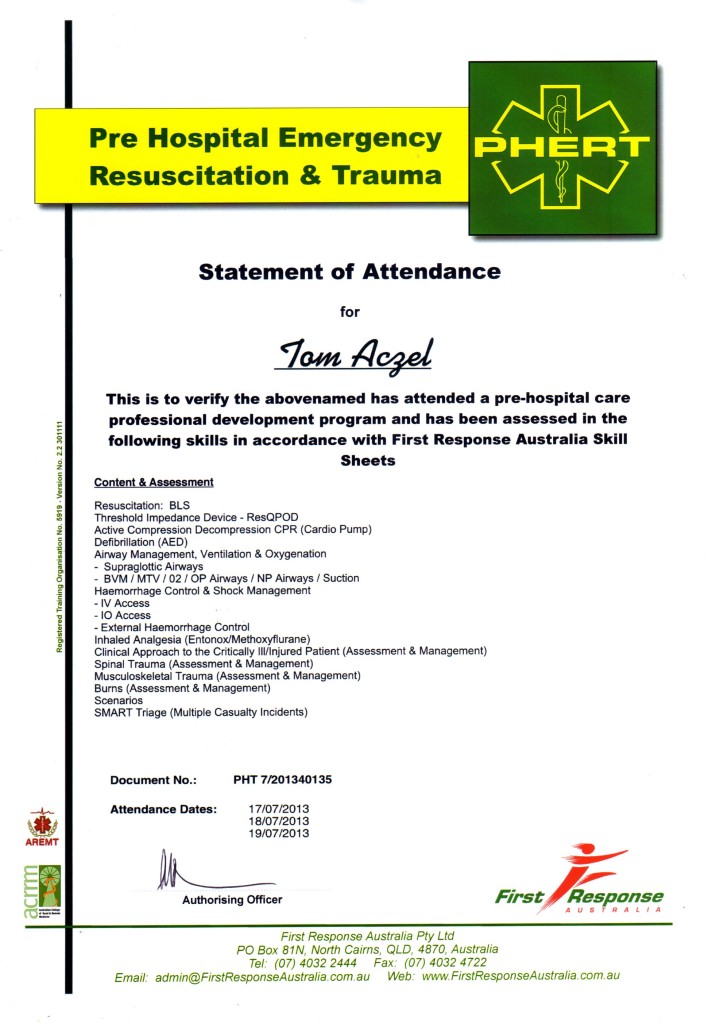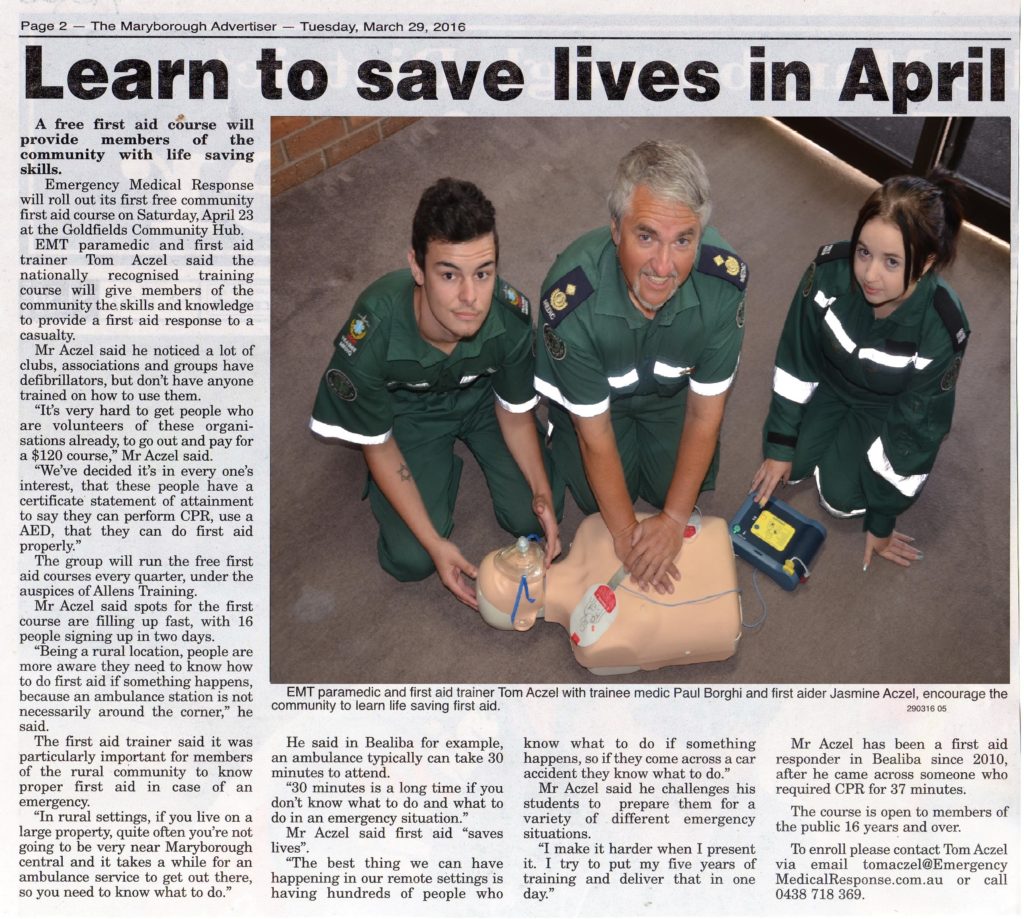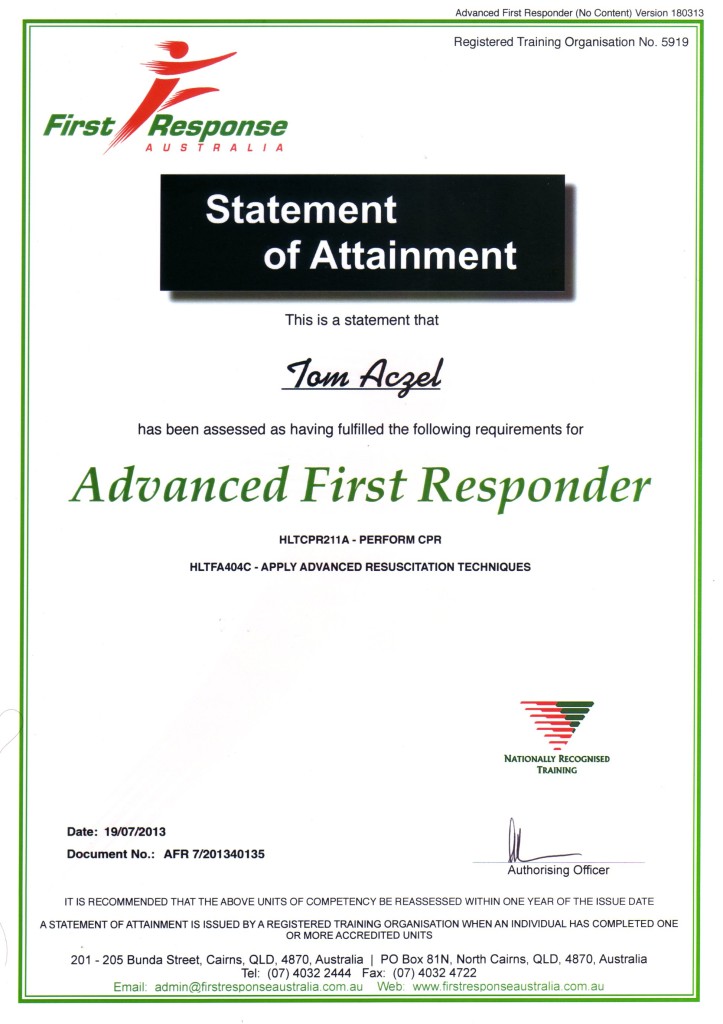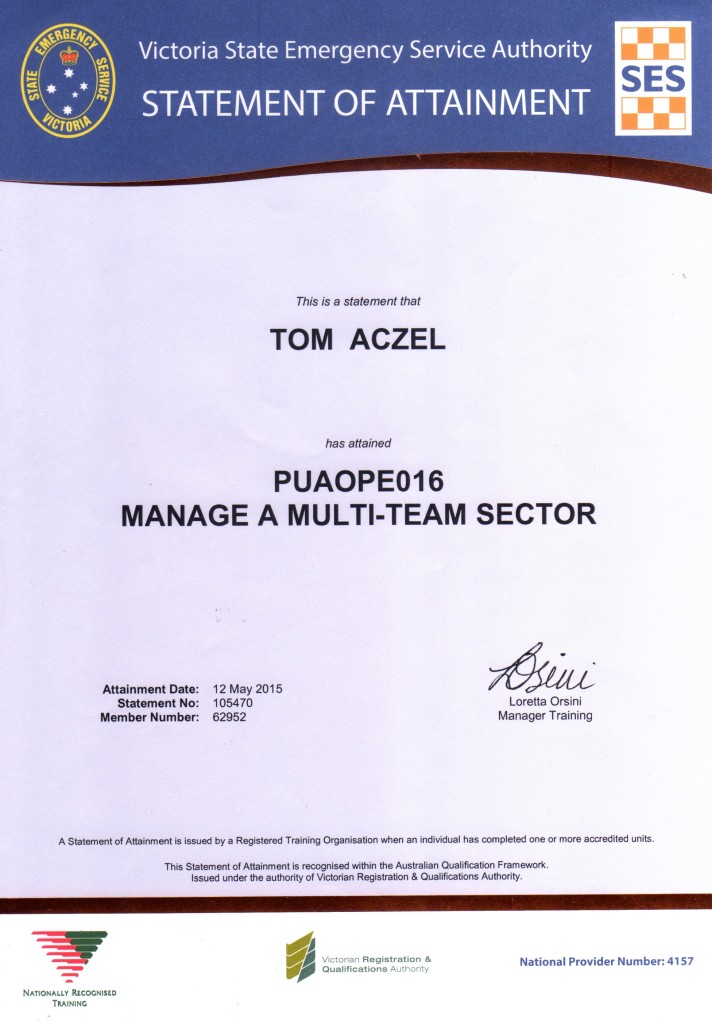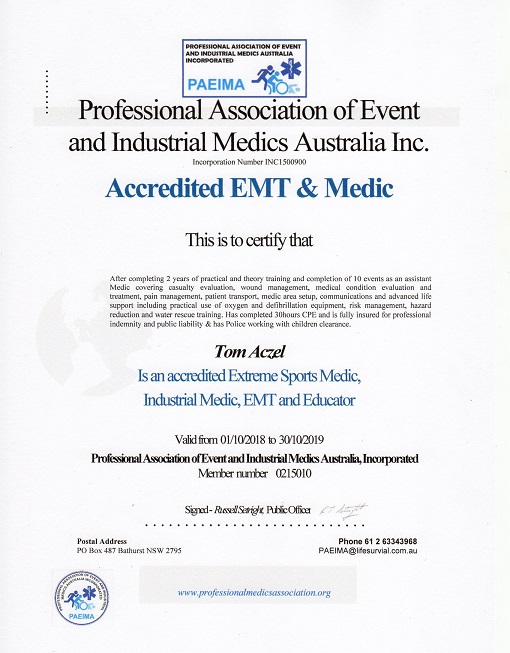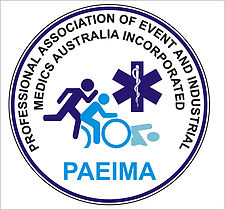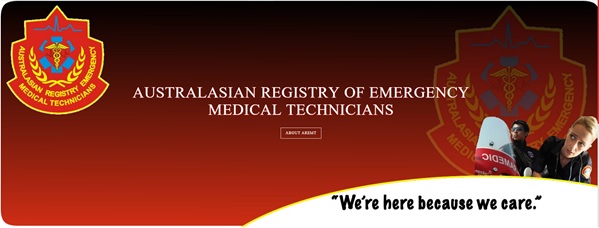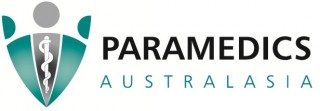Tom Aczel, Founder & CEO of Emergency Medical Response, a Electrical Fitter by trade, a former computer programmer, a First Aid Trainer and otherwise works as a Paramedic providing Event First Aid Services.
Tom has been self employed since 1992 running FlexTools, his own part time software retail internet business over the World Wide Web and has managed sections, departments and businesses in the past. In 2010, he commenced work as a Volunteer Community First Responder in his local Central Goldfields Victoria town of Bealiba as Bealiba Community First Response. Today he owns and operates a team of staff and volunteers at Emergency Medical Response, a Event First Aid Provider Service, based out of Bealiba, Victoria.
His family have now lived in Bealiba for over eleven years since moving from Melbourne in 2008. .
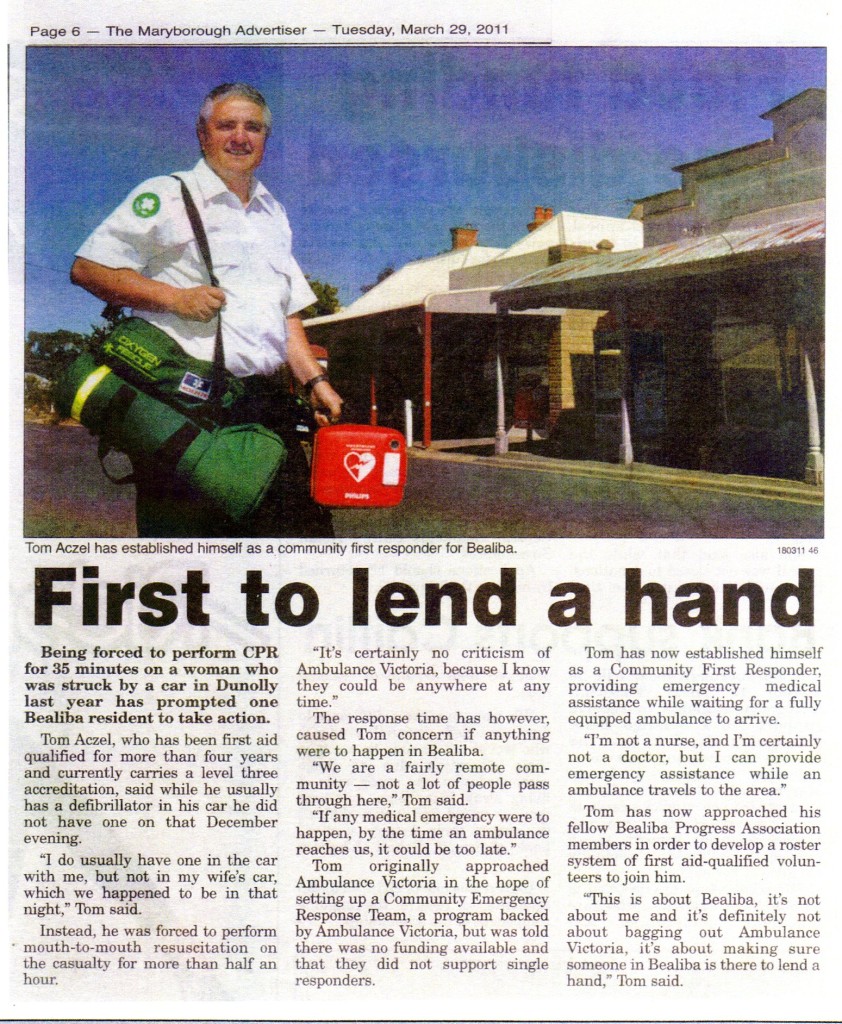
Emergency Medical Response currently maintains a fleet of two Ambulances (ex-Rural Ambulance Victoria 2006 and ex-Queensland Ambulance Service 2005 Mercedes-Benz Sprinter) as well as a number Emergency Response Vehicles including a 2012 Toyota HiLux 4WD Response Vehicle, Honda Blackbird Motorcycle (for cycling events), Suzuki Trail Bike (for Mountain Bike Riding or Hiking Events) and even an ex-CFA Isuzu 1991 FSR 500 Fire Tanker. These vehicles are utilised in the initial management of the full range of local emergency callouts and standby services.
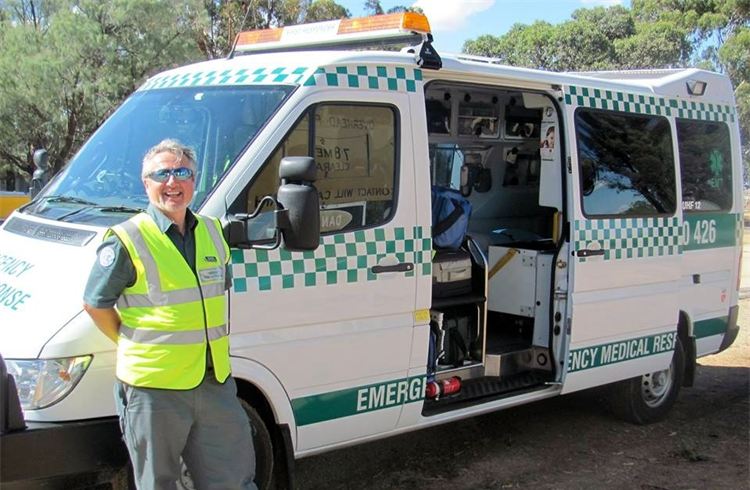
As our First Aid Trainer, Tom constantly maintains First Aid refresher updates : –
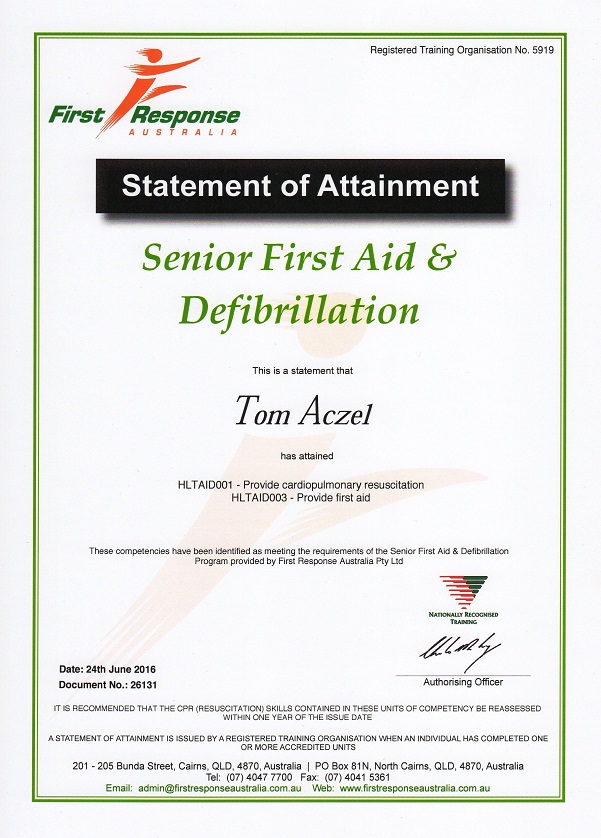

and he regularly undertakes ongoing pre-hospital care professional development programs such as PHERT (Pre Hospital Emergency Resuscitation & Trauma) program run by First Response Australia) in 2013, 2016 & 2018: –
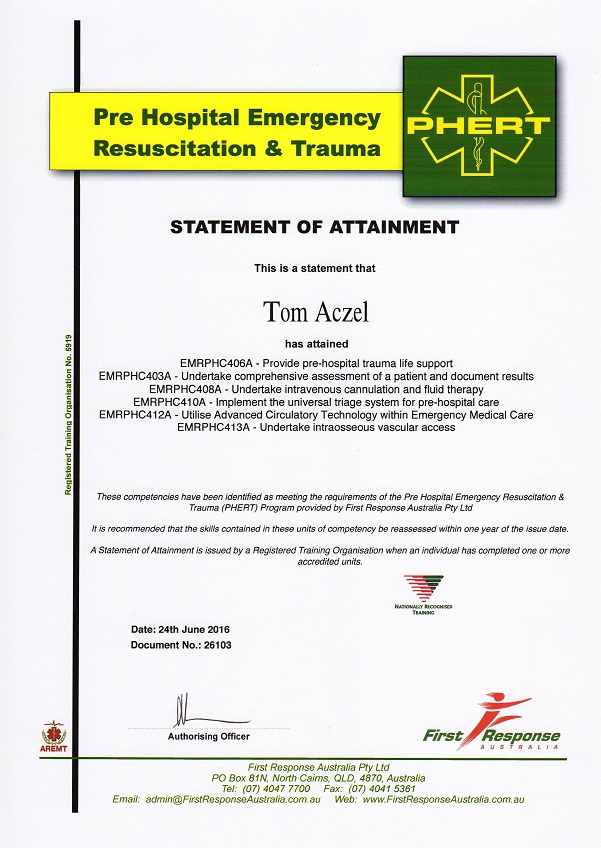
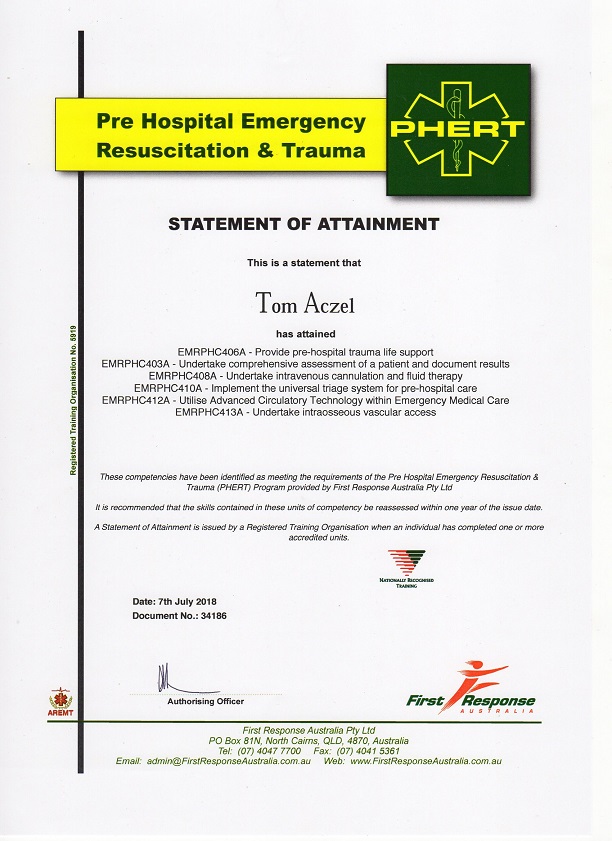
Pre Hospital Emergency Resuscitation & Trauma
EMRPHC406A – Provide pre-hospital trauma life Support
EMRPHC403A – Undertake comprehensive assessment of a patient and document results
EMRPHC408A – Undertake intravenous cannulation and fluid therapy
EMRPHC410A – Implement the universal triage system for pre-hospital care
EMRPHC411A – Apply and interpret electrocardiographs
EMRPHC412A – Utilise Advanced Circulatory Technology within Emergency Medical Care
EMRPHC413A – Undertake intraosseous vascular access
This unique 3 day multi-disciplinary program is designed to further develop and enhance knowledge and skills of health care professionals. Suitable to refresh qualifications and gain currency in skills for prehospital care providers and provide valuable professional development to any hospital/allied health care worker. This program consists of ‘national recognised’ units of competency from the Certificate IV in Emergency Medical Response (10367NAT)
The program is also accredited by the Australian College of Rural and Remote Medicine (ACRRM) and recognised by the Australasian Registry of Emergency Medical Technicians (AREMT). This program delivers the latest advances and innovations in medical/trauma emergency management.
In 2015, Tom obtained a TAE40110 – Certificate IV in Training and Assessment with inspire education in order for Emergency Medical Response to expand into providing First Aid Training and to further train our own volunteers. This qualification is essential for people who wish to develop their skills in the design, delivery and assessment of vocation-based training. It also qualifies you to deliver nationally-accredited vocational training in TAFEs, private and enterprise-based registered training organisations as well as in secondary schools with vocational programs
 TAE40110 – Certificate IV in Training and Assessment
TAE40110 – Certificate IV in Training and Assessment
TAEDES401A – Design and develop learning programs
TAEDES402A – Use training packages and accredited courses to meet client needs
TAEDEL401A – Plan, organise and deliver group-based learning
TAEDEL402A – Plan, organise and facilitate learning in the workplace
TAEASS401B – Plan assessment activities and processes
TAEASS402B – Assess competence
TAEASS403B – Participate in assessment validation
BSBCMM401A – Make a presentation
TAEASS301B – Contribute to assessment
TAEDEL301A – Provide work skill instruction
TAELLN411 – Address Adult Language, Literacy and Numeracy Skills
The Standards for Registered Training Organisations (RTOs) 2015 have mandated that all VET trainers and assessors need to hold one of the following credentials from 1 July, 2019:
1. Credential: TAE40116 Certificate IV in Training and Assessment or its successor
OR
2. Credential: TAE40110 Certificate IV in Training and Assessment,
and one of the following:
i. TAELLN411 Address adult language, literacy and numeracy skills or its successor or
ii. TAELLN401A Address adult language, literacy and numeracy skills
and one of the following:
i. TAEASS502 Design and develop assessment tools or its successor or
ii. TAEASS502A Design and develop assessment tools.
iii. TAEASS502B Design and develop assessment tools
OR
3. Credential: A diploma or higher level qualification in adult education.
In February, 2019, Tom Aczel also successfully completed all of the requirements for TAE40116 Certificate IV in Training and Assessment.
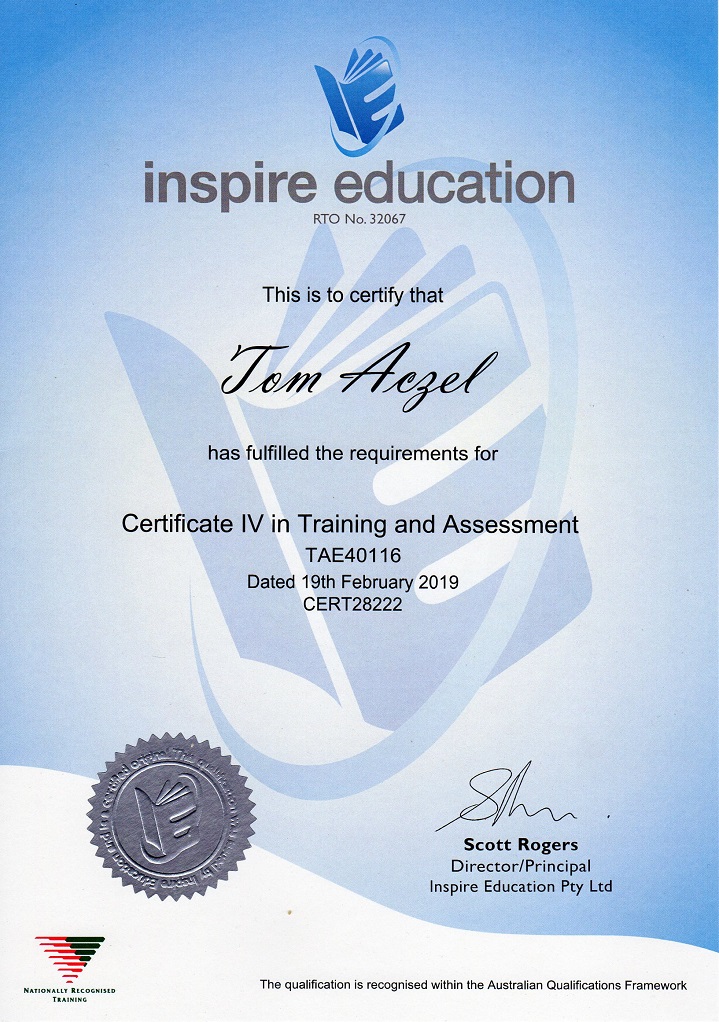
TAE40116 – Certificate IV in Training and Assessment
TAEDES401 – Design and develop learning programs
TAEDES402 – Use training packages and accredited courses to meet client needs
TAEDEL401 – Plan, organise and deliver group-based learning
TAEDEL402 – Plan, organise and facilitate learning in the workplace
TAEASS401 – Plan assessment activities and processes
TAEASS402 – Assess competence
TAEASS403 – Participate in assessment validation
TAEASS502 – Design and develop assessment tools
TAELLN411 – Address adult language, literacy, and numeracy skills
BSBCMM401 – Make a presentation
First Aid Training
Emergency Medical Response delivers nationally recognised training and assessment on behalf of Allens Training Pty Ltd RTO 90909. Tom Aczel, Paramedic and Jasmine Aczel, Event Medic are approved trainers for the courses listed here (or their equivalent replacements) on behalf of Allens Training Pty Ltd RTO 90909.

Tom Aczel has studied the following emergency medical qualifications, Certificate II in Emergency Medical Service First Response, Certificate IV in Emergency Medical Technician, Certificate IV in Emergency Medical Response, Certificate IV in Health Care (Ambulance), Diploma of Paramedical Science (Ambulance) as well as a number of other First Responder, Medic and Emergency Medical Technician Competencies.

HLT50412 Diploma of Paramedical Science (Ambulance)
HLTAMBAE501D Implement safe access and egress in an emergency
HLTAMBAS501B Conduct clinical assessment
HLTAMBCR502C Deliver standard clinical care
HLTAMBFC402C Communicate in complex or difficult situations
HLTAMBPD401C Manage personal stressors in the work environment
HLTHIR402D Contribute to organisational effectiveness in the health industry
HLTWHS456A Identify, assess and control whs risk in own work
PUAEME001B Provide emergency care
HLTAMBSC503B Contribute to managing the scene of an emergency
HLTAMBT402C Transport emergency clients
CHCCS400C Work within a relevant legal and ethical framework
HLTHIR403C Work effectively with culturally diverse clients and co-workers
HLTAMBAE504D Follow procedures for safe extrication of clients in life threatening situations
PUASAR001B Participate in a rescue operation
BSBFLM303C Contribute to effective workplace relationships
HLTAMBAE403D Follow procedures for routine safe removal of client
HLTAMBCR401C Deliver basic clinical care (Note pre-requisite: HLTAP401B)
HLTAMBFC301D Communicate with clients and colleagues to support health care
HLTAMBSC401B Manage routine scene and promote public safety
HLTAMBT301B Transport non-emergency clients under operational conditions
HLTAP401B Confirm physical health status
HLTIN301C Comply with infection control policies and procedures
HLTWHS300A Contribute to WHS processes
He has also fulfilled the requirements for the following courses and modules with St John Ambulance, Parasol EMT and First Response Australia: –
HLT21107 Certificate II in Emergency Medical Service First Response
HLTFA402B – Apply Advanced First Aid
BSBMED201A – Use Basic Medical terminology
HLTCSD305B – Assist with client movement
BSBCMN204A – Work effectively with others
HLTAMBFC301B – Communicate with clients and colleagues to support health care
69834 Certificate IV in Emergency Medical Technician
HLTAMBAE501C – Implement safe access and egress in an emergency
HLTAMBAS501B – Conduct clinical assessment
HLTAMBT301B – Transport non-emergency clients under operational conditions
HLTAMBT402C – Transport emergency clients
HLTAP401B – Confirm physical health status
PAS001A – Deliver out of hospital casualty care
PAR002A – Safely remove casualties
PAR003A – Safe extrication of a casualty in potential life threatening situations
PAR004A – Safe handling of medical gas
PAR006A – Plan emergency response
PAR007A – Administer intravenous cannulation
PAR008A – Undertake rescue operations
PAR100A – Administer analgesic gas
Certificate IV in Emergency Medical Response
This unique Emergency Medical Technician program is designed for advanced medical skills and knowledge. Suited for first responders, mine rescue, fire fighters, road rescue, remote resort dive & tour operations, ship’s masters and security personnel. This program is the only true Certificate IV EMT program in the country and incorporates the highest clinical content of any program below the Diploma level.
 30714QLD Certificate IV in Emergency Medical Response
30714QLD Certificate IV in Emergency Medical Response
WEC01A – Assess the situation and provide basic care to manage life-threatening emergencies
WEC04A – Prioritise emergency action and manage road accidents
WEC05A – Identify and manage bleeding, wounds and eye injuries
WEC06A – Identify, manage and prevent burns and exposure to extremes of temperature
WEC07A – Identify, and manage bone, joint, chest, abdominal and pelvic injuries
WEC08A – Identify, manage and prevent bites, stings and poisoning
WEC09A – Administer emergency care to identify and manage acute illness
EMT01A – Orientation to emergency medical care
EMT02A – Apply health assessment practice within the emergency medical services system
EMT03A – Assess and administer emergency medical care to casualties
EMT04A – Move and lift casualties
EMT05A – Manage and maintain an airway and provide oxygen resuscitation and therapy
EMT06A – Undertake initial assessment and comprehensive examination of a casualty and document results
EMT07A – Assist with the self administration of medications
EMT08A – Manage respiratory, cardiovascular, diabetic, altered mental state and allergic emergencies
EMT09A – Identify and manage poisoning and overdose emergencies
EMT10A – Prevent, identify and manage environmental emergencies
EMT11A – Recognise and manage bleeding, shock and soft tissue injuries
EMT12A – Recognise and manage musculoskeletal, head and spinal injuries
EMT13A – Undertake advanced airway management
EMT16A – Undertake intravenous fluid therapy under medical direction
EMT18A – Manage multiple casualty incidents using triage
WEC02A – Select and operate specialist emergency care equipment (Intraosseous Vascular Access)
EMRPHC407A – Undertake Wound Identification, Management and Closure
Certificate IV in Health Care (Ambulance) National Code: HLT41012
This qualification focuses on work in the ambulance industry done by volunteers or workers who provide a basic emergency response and transport roles in areas where there is a relatively low workload.
Occupational titles may include Volunteer Ambulance Officer, Ambulance Community Officer (ACO), Ambulance Transport Attendant (ATA), Honorary Ambulance Officer, Casual Ambulance Officer, Emergency Patient Transport Officer or Industrial Medic (EMT-I).
 HLT41012 Certificate IV in Health Care (Ambulance)
HLT41012 Certificate IV in Health Care (Ambulance)
BSBFLM303C – Contribute to effective workplace relationships
HLTHIR402D – Contribute to organisational effectiveness in the health industry
HLTHIR301C – Communicate and work effectively in health
HLTAMBFC301D – Communicate with clients and colleagues to support health care
HLTWHS300A – Contribute to WHS processes
HLTIN301C – Comply with infection control policies and procedures
HLTAP401B – Confirm physical health status
HLTAMBPD401C – Manage personal stressors in the work environment
HLTAMBCR401C – Deliver basic clinical care
HLTAMBAE403D – Follow procedures for routine safe removal of a client
HLTAMBSC401B – Manage routine scene and promote public safety
HLTAMBT301B – Transport non-emergency clients under operational conditions
HLTAMBT402C – Transport emergency clients
BSBMED301B – Interpret and apply medical terminology appropriately
PUAEME001B – Provide emergency care
PUAEME002C – Manage injuries at an emergency incident
HLTAMBAE501D – Implement safe access and egress in an emergency
HLTAMBSC503B – Contribute to managing the scene of an emergency
HLTHIR403C – Work effectively with culturally diverse clients and coworkers
Other First Responder Competencies
Advanced First Responder
HLTCPR211A – Perform CPR
HLTHIR404C – Apply Advanced Resuscitation Techniques
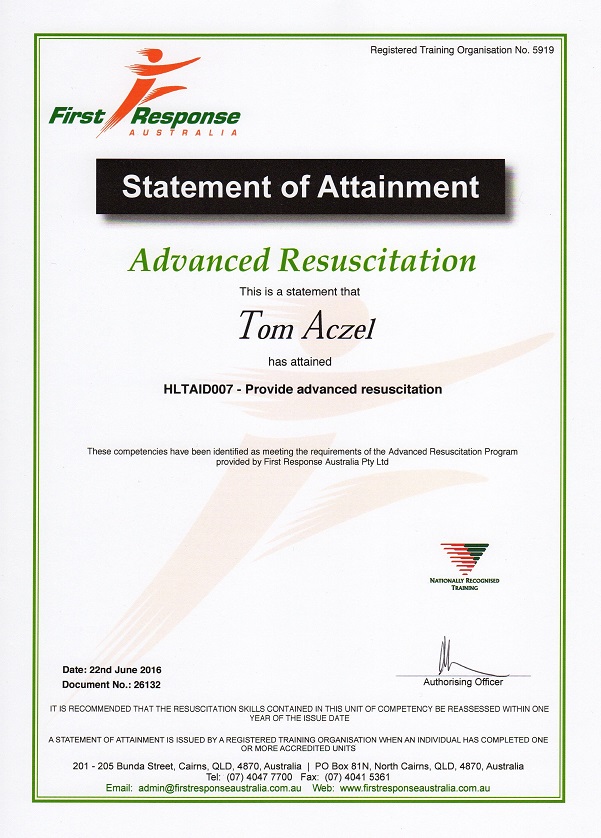
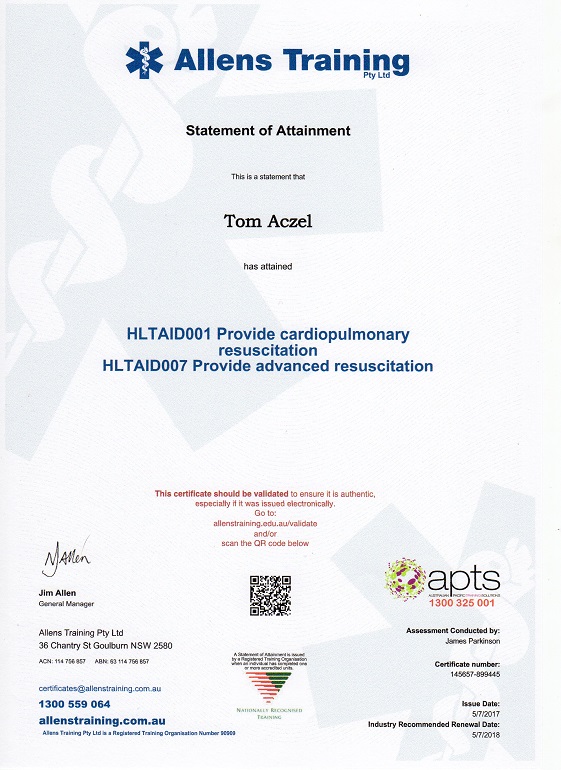

HLTAID007 Provide Advanced Resuscitation
This unit describes the skills and knowledge required to use specialised equipment in the provision of resuscitation in line with the Australian Resuscitation Council (ARC) guidelines. These competencies have been identified as meeting the requirements of the Advanced First Responder Program provided by First Response Australia Pty Ltd.
CPR (Cardio Pulmonary Resuscitation)
ResQPOD
Oropharyngel Airways
O2 Therapy
Demand Valve
Bag Valve Mask Device
Suction Device
Supraglottic Airways (i-gel)
Automated External Defribrillator
Manually Triggered Ventilator (MTV)
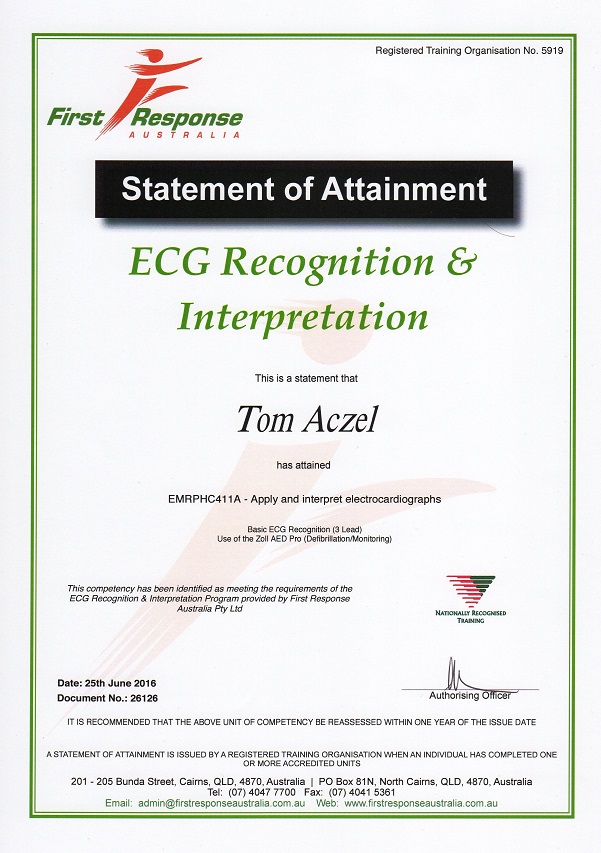
EMRPHC411A – Apply and interpret electrocardiographs
CFA (FIRE & RESCUE) Competencies
Q0002A – CFA WILDFIRE FIREFIGHTER
Q0003A – CFA WILDFIRE-LOW STRUCTURE FIREFIGHTER
Q0004A – CFA WILDFIRE STRUCTURE FIREFIGHTER
PUAFIR202b – RESPOND TO ISOLATED/REMOTE STRUCTURE FIRE
PUAFIR207 – OPERATE BREATHING APPARATUS (OPEN CIRCUIT)
PUAFIR201 – PREVENT INJURY
PUAOHS002 – MAINTAIN SAFETY AT AN INCIDENT SCENE
PUAFIR204 – RESPOND TO WILDFIRE
PUAFIR309 – OPERATE PUMPS
END TANKER – (G) ENDORSEMENT FOR THE PUMP ON TANKER (GENERIC)
PUATEA001 – WORK IN A TEAM
PUAOPE002 – OPERATE COMMUNICATIONS SYSTEMS AND EQUIPMENT
CFA076 – HAZMAT AWARENESS
VICSES (SEARCH & RESCUE) Competencies
VICSES09001 – GENERAL RESCUE FUNDAMENTAL SKILLS
IA08MTO – MANAGING TRAFFIC AT OPERATIONS
PUAOHS001C – FOLLOW DEFINED OCCUPATIONAL HEALTH AND SAFETY POLICES AND PROCEDURES
PUAOHS002B – MAINTAIN SAFETY AT AN INCIDENT SCENE
PUASAR001B – PARTICIPATE IN A RESCUE OPERATION
PUAEME001B – PROVIDE EMERGENCY CARE
PUAEME002C – MANAGE INJURIES AT EMERGENCY INCIDENT
PUATEA001B – WORK IN A TEAM
PUAOPE002B – OPERATE COMMUNICATIONS SYSTEMS & EQUIPMENT
PUACOM001C – COMMUNICATE IN THE WORKPLACE
22022VIC – COURSE IN THE AUSTRALASIAN INTER-SERVICE INCIDENT MANAGEMENT SYSTEM (AIIMS)
PUAOPE012 – CONTROL A LEVEL 1 INCIDENT / AIIMS CREW LEADER
PUAOPE015A – CONDUCT BRIEFINGS / DEBRIEFINGS
PUAOPE016 – MANAGE A MULTI TEAM SECTOR / AIIMS SECTOR/DIVISION COMMANDER
VICSES13001 – LIAISE WITH MEDIA AT LOCAL LEVEL
FPICOT2239B – TRIM AND CUT FELLED TREES
PUASES008A – UNDERTAKE STORM AND WATER DAMAGE OPERATIONS
PUASES013A – UNDERTAKE STORM AND WATER DAMAGE OPERATIONS PERFORMED AT HEIGHTS
PAEIMA
Tom Aczel is an PAEIMA accredited Extreme Sports Medic, Industrial Medic, EMT-Advanced Care Technician and Educator. PROFESSIONAL ASSOCIATION OF EVENT & INDUSTRIAL MEDICS AUSTRALIA Inc (PAEIMA) Membership status as an Event Medic Practitioner enriches the willingness of individual practitioners to accept and fulfil obligations to society, other medical professionals, and the EMS profession. As a pre-hospital Medic practitioner, Tom Aczel solemnly pledges himself to the following code of professional ethics:
-
to conserve life, alleviate suffering, promote health, do no harm, and encourage the quality and equal availability of emergency medical care.
-
to provide services based on human need, with compassion and respect for human dignity, unrestricted by consideration of nationality, race, creed, colour, or status; to not judge the merits of the patient’s request for service, nor allow the patient’s socioeconomic status to influence our demeanour or the care that we provide.
-
to not use professional knowledge and skills in any enterprise detrimental to the public well-being.
-
to respect and hold in confidence all information of a confidential nature obtained in the course of professional service unless required by law to divulge such information.
-
to use social media in a responsible and professional manner that does not discredit, dishonour, or embarrass an other organizations, co-workers, other health care practitioners, patients, individuals or the community at large.
-
as a citizen, to understand and uphold the law and perform the duties of citizenship; as a professional, to work with concerned citizens and other health care professionals in promoting a high standard of emergency medical care to all people.
-
to maintain professional competence, striving always for clinical excellence in the delivery of patient care.
-
to assume responsibility in upholding standards of professional practice and education.
-
to assume responsibility for individual professional actions and judgment, both in dependent and independent emergency functions, and to know and uphold the laws which affect the practice of Medic.
-
to be aware of and participate in matters of legislation and regulation affecting First Aid.
-
to work cooperatively with all emergency associates and other allied healthcare professionals in the best interest of our patients.
-
to refuse participation in unethical procedures.
AREMT
Tom Aczel’s professional Emergency Medical Technician (EMT-Advanced Care Technician) qualifications are also recognised within the Australia, Oceania, South East Asia, China and UK Regions with the Australasian Registry of Emergency Medical Technicians (AREMT) which are comparable to the United States of America National Registry of Emergency Medical Technicians (NREMT) system.
The Australasian Registry of Emergency Medical Technicians mission statement is to provide an internationally recognised Australian Registry of certified EMTs underpinned by current relevant Australian and international EMT qualifications and guidelines. The recognition of Industrial, private and Ambulatory EMTs.
AREMT is to be an independent, non governmental and free standing organisation established to further the recognition, status and continuing education of EMTs in Australia and overseas.
AREMT aims to provide registered EMTs the ability to have their skills recognised in Australia and internationally with other overseas countries whose EMT organisations are affiliated with AREMT and have reciprocation with AREMT.

Tom Aczel is an member of the Australian & New Zealand College of Paramedicine (ANZCP). The College represents paramedics and those involved in the pre and out-of-hospital care, in the many forms it takes. They have, and they welcome members from all around Australia, New Zealand, and overseas.
The College started life in 1973 as the Institute of Ambulance Officers and we were the NSW branch, which later became the Australian College of Ambulance Professionals (NSW Branch), (or ACAPnsw for short). In 2012 they became the Australian and New Zealand College of Paramedicine, a name which better reflects who we represent and what the College does.
Their members include paramedics of all clinical levels, paramedics working in very different fields, including State Ambulance Services, mining fields, private providers covering many different events including large gatherings, sporting events and many other situations where the need for paramedic care is recognised. Our membership also includes doctors, nurses, emergency call centre and dispatch centre staff, paramedic academics, aeromedical paramedics, retrievalists, first responders, volunteers and of course those of the future, student paramedics, are members of the College!
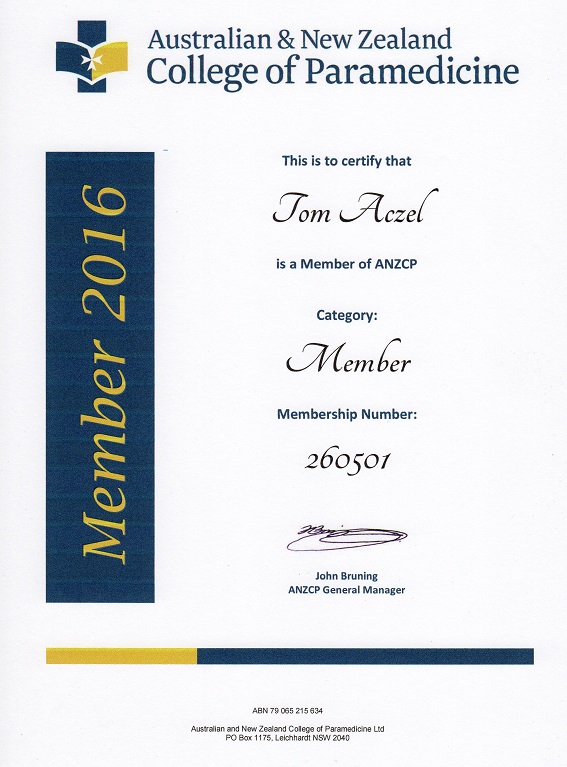
Tom has also fulfilled the criteria to be admitted as a Member of Paramedics Australasia. Paramedics Australasia (PA) is the national professional association representing practitioners who provide paramedic services to the community. Paramedic practitioners are best known for their involvement in the delivery of out of hospital emergency medical care through their work with various Ambulance Service organisations throughout Australia. However, paramedics work in many environments including community, industrial, military and university settings as well as on humanitarian and relief operations
Scope of Practice
- Australian Resuscitation Council – Basic Life Support including use of Laryngeal Mask Airway (LMA)
- Use of Infection Control practices relevant to clinical environment
- Attendance at and initial management of the full range of emergency callouts
- Use of ECG monitor and pulse oximetry
- Use of an automated external defibrillator
- Emergency Management of Cardiac Arrest
- Administration of a limited range of medications according to local protocols to assist with the management of asthma, anaphylaxis, burns, narcotic overdose, chest pain, ACPO, hypoglycaemia, pain control & seizures
- Mental Health Crisis Intervention
- Management of patients across the lifespan including emergency childbirth (uncomplicated)
- Ongoing Management of Intravenous Infusions
- Spinal Stabilisation
- Use of stretchers and patient movement devices
- Emergency triage
- Emergency driving

Tom is also the admin of our Emergency Medical Response facebook page:

